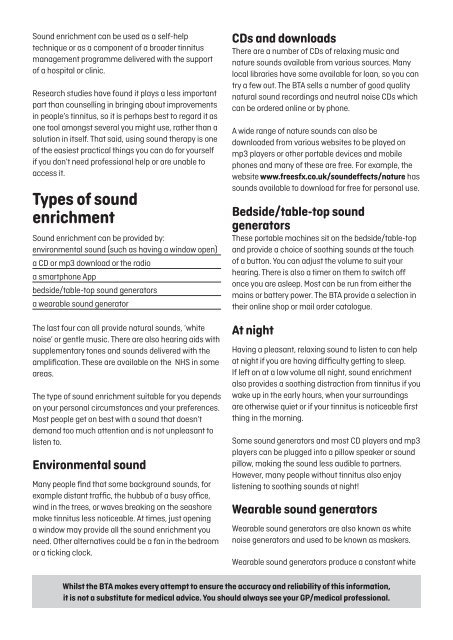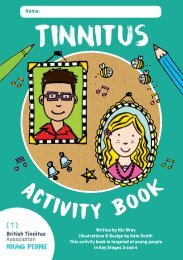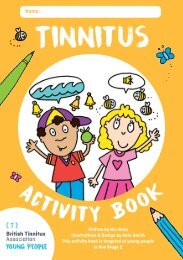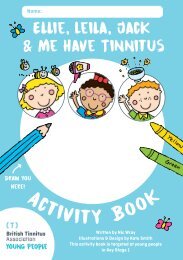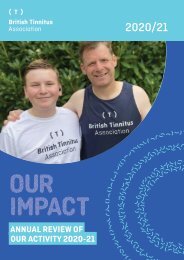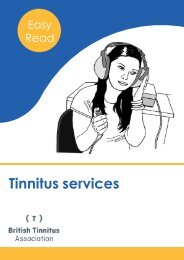Sound enrichment (therapy) Ver 2.1
You also want an ePaper? Increase the reach of your titles
YUMPU automatically turns print PDFs into web optimized ePapers that Google loves.
<strong>Sound</strong> <strong>enrichment</strong> can be used as a self-help<br />
technique or as a component of a broader tinnitus<br />
management programme delivered with the support<br />
of a hospital or clinic.<br />
Research studies have found it plays a less important<br />
part than counselling in bringing about improvements<br />
in people’s tinnitus, so it is perhaps best to regard it as<br />
one tool amongst several you might use, rather than a<br />
solution in itself. That said, using sound <strong>therapy</strong> is one<br />
of the easiest practical things you can do for yourself<br />
if you don’t need professional help or are unable to<br />
access it.<br />
Types of sound<br />
<strong>enrichment</strong><br />
<strong>Sound</strong> <strong>enrichment</strong> can be provided by:<br />
environmental sound (such as having a window open)<br />
a CD or mp3 download or the radio<br />
a smartphone App<br />
bedside/table-top sound generators<br />
a wearable sound generator<br />
The last four can all provide natural sounds, ‘white<br />
noise’ or gentle music. There are also hearing aids with<br />
supplementary tones and sounds delivered with the<br />
amplification. These are available on the NHS in some<br />
areas.<br />
The type of sound <strong>enrichment</strong> suitable for you depends<br />
on your personal circumstances and your preferences.<br />
Most people get on best with a sound that doesn’t<br />
demand too much attention and is not unpleasant to<br />
listen to.<br />
Environmental sound<br />
Many people find that some background sounds, for<br />
example distant traffic, the hubbub of a busy office,<br />
wind in the trees, or waves breaking on the seashore<br />
make tinnitus less noticeable. At times, just opening<br />
a window may provide all the sound <strong>enrichment</strong> you<br />
need. Other alternatives could be a fan in the bedroom<br />
or a ticking clock.<br />
CDs and downloads<br />
There are a number of CDs of relaxing music and<br />
nature sounds available from various sources. Many<br />
local libraries have some available for loan, so you can<br />
try a few out. The BTA sells a number of good quality<br />
natural sound recordings and neutral noise CDs which<br />
can be ordered online or by phone.<br />
A wide range of nature sounds can also be<br />
downloaded from various websites to be played on<br />
mp3 players or other portable devices and mobile<br />
phones and many of these are free. For example, the<br />
website www.freesfx.co.uk/soundeffects/nature has<br />
sounds available to download for free for personal use.<br />
Bedside/table-top sound<br />
generators<br />
These portable machines sit on the bedside/table-top<br />
and provide a choice of soothing sounds at the touch<br />
of a button. You can adjust the volume to suit your<br />
hearing. There is also a timer on them to switch off<br />
once you are asleep. Most can be run from either the<br />
mains or battery power. The BTA provide a selection in<br />
their online shop or mail order catalogue.<br />
At night<br />
Having a pleasant, relaxing sound to listen to can help<br />
at night if you are having difficulty getting to sleep.<br />
If left on at a low volume all night, sound <strong>enrichment</strong><br />
also provides a soothing distraction from tinnitus if you<br />
wake up in the early hours, when your surroundings<br />
are otherwise quiet or if your tinnitus is noticeable first<br />
thing in the morning.<br />
Some sound generators and most CD players and mp3<br />
players can be plugged into a pillow speaker or sound<br />
pillow, making the sound less audible to partners.<br />
However, many people without tinnitus also enjoy<br />
listening to soothing sounds at night!<br />
Wearable sound generators<br />
Wearable sound generators are also known as white<br />
noise generators and used to be known as maskers.<br />
Wearable sound generators produce a constant white<br />
Whilst the BTA makes every attempt to ensure the accuracy and reliability of this information,<br />
it is not a substitute for medical advice. You should always see your GP/medical professional.


